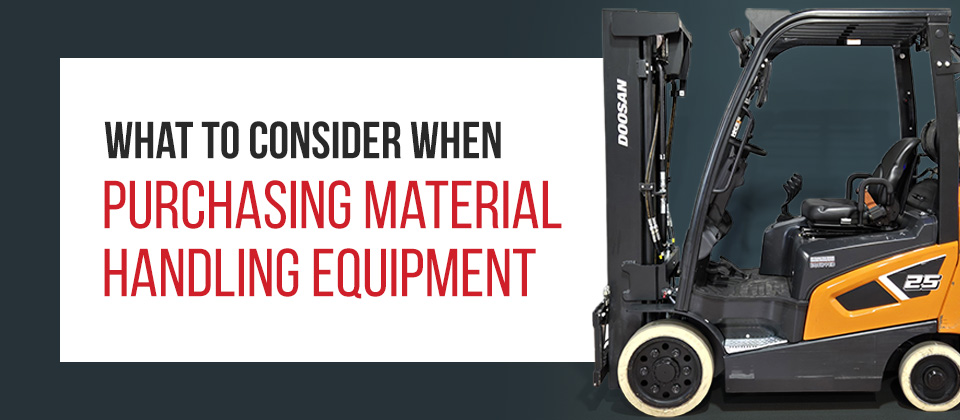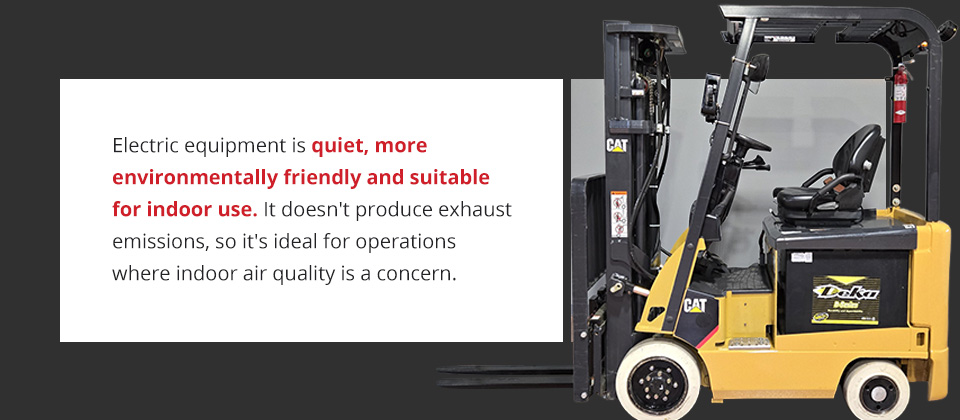What to Consider When Purchasing Material Handling Equipment

Purchasing material handling equipment involves choosing machinery that will align with your company’s budget, needs and the demands of your daily operations. The right choice can help you streamline your workflow and improve productivity.
This guide provides key considerations when buying heavy lift equipment.
Type of Material to Be Handled
Each type of material has specific requirements. Keep the following in mind when choosing heavy lift equipment:
- Bulk and loose material: If your operations involve gravel, sand, soil or raw materials, you’ll need equipment built for weight and containment. Since these materials are heavy and can shift easily, stability and control are critical to prevent spillage and safety risks for workers on the ground.
- Palletized goods and standardized loads: Boxes, crates and other items commonly arranged on pallets are among warehouses’ most frequently moved materials. Compact equipment is ideal because it can maneuver confined spaces and lift loads to significant heights.
New vs. Used Equipment
New equipment often comes with a higher price tag, and that upfront investment can strain the budget for some businesses. Finance options with flexible payment terms can help you allocate your budget to other business operations. New equipment generally has a longer expected lifespan. When you purchase new equipment, you get machinery with no wear and tear, and it will likely serve you reliably for many years before you need significant repairs. New equipment often comes with comprehensive warranty coverage to cover you from unexpected costs and repairs in the first few years of ownership.
Buying used industrial equipment can offer significant savings. This cost difference can make this a more attractive option for smaller businesses just starting out. Although some used equipment typically comes with no warranty, most reputable dealers offer refurbished equipment with a short-term warranty. If you go the used route, ensure parts are readily available. It’s also wise to ask for maintenance records and inspect the equipment to gauge its condition.
Initial and Operational Costs
Purchasing industrial machinery is a significant investment, so budgeting for the purchase price and long-term expenses is essential.
Upfront Purchase
The initial equipment cost is often the largest single expense, and prices vary depending on brand, size, power source and additional features. Going for the more affordable option upfront may be tempting, but a higher-priced quality model might save you money in the long run. Durable, well-made equipment often requires fewer repairs and can operate longer before replacement is necessary.
Fuel Type, Maintenance and Repairs
Fuel choice affects your equipment’s operating expenses, environmental impact and suitability for certain settings:

- Electric-powered equipment: Electric equipment is quiet, more environmentally friendly and suitable for indoor use. It doesn’t produce exhaust emissions, so it’s ideal for operations where indoor air quality is a concern. Because of fewer moving parts, electric equipment requires less maintenance than fuel-powered models. Electric machines have lower operational costs but have specific charging requirements.
- Diesel-powered equipment: Diesel-powered equipment is often the go-to in industries that need heavy-duty machinery capable of handling large loads. Diesel engines generally offer higher torque and durability to handle rugged tasks and rough terrains. However, diesel-powered machines produce exhaust emissions, so they might be less suited for indoor use. Additionally, diesel equipment has higher fuel costs and may require more maintenance because of the engine’s complexity.
- Propane-powered equipment: Propane-powered equipment balances power and environmental impact. Although less clean than electric options, propane engines produce fewer emissions than diesel. They’re popular indoors and outdoors because they offer power and flexibility. Propane equipment can run continuously as long as you can access propane tanks.
Industrial machinery upkeep generally includes:
- Regular inspections
- Part replacements
- Occasional repairs
Some suppliers offer service plans or extended warranties that cover certain maintenance needs to help you manage ongoing costs.
Size of Facility and Space Requirements
Take a good look at your facility’s layout. Measure the widths, ceiling heights and general footprint of your work area. Many warehouses and industrial spaces have narrow aisles, low ceilings or tight turns, limiting the types of equipment that can move around comfortably. If your aisles are narrow, consider equipment with a tighter turning radius or compact models designed for confined spaces.
Larger facilities with wide aisles and open storage areas might benefit from heavier, bulkier machines with higher load capacity since maneuverability is less of a concern.
Consider where you’ll store the equipment when it’s not in use. Determine whether you have sufficient space to park the equipment without blocking aisles or other key areas. If space is limited, choose equipment that’s easy to store or collapsible for smaller footprints.
As your business grows, your space requirements and layout may change, so your equipment should be able to adapt. Equipment attachments offer more flexibility in your facility.
Operational Needs
The right piece of equipment should be able to handle the loads and streamline workflow, reduce bottlenecks and enhance overall efficiency. Assess the daily demands of your workflow. How often will the equipment be used, and for what kinds of tasks? If you need equipment that will operate continuously throughout the day, it’s vital to choose durable machinery designed for long cycles.
Additionally, consider how quickly your equipment needs to move loads from point A to B. Faster, more agile machinery may be ideal for high-speed operations. For industries where machinery might sit idle in between tasks, you may not need the same speed, so you might prioritize stability and power.
Safety
Heavy equipment involves certain risks, and taking the right precautions is essential to protect employees and assets. Here’s how to maintain a safe workplace:
- Operator training and certification: Operators who understand their equipment’s capabilities, limitations and safety features are less likely to be involved in accidents. Many businesses require operators to undergo formal certification training when handling high-capacity or complex machinery. Training should cover equipment controls, weight capacities and proper loading techniques. It’s also beneficial to undergo training refreshers to stay updated with industry standards.
- Workplace safety: Evaluate how well the equipment aligns with your organization’s protocols. These could be weight limits, clearance requirements or restricted operation zones.
- Routine maintenance and inspection: A proactive maintenance plan helps catch problems early to reduce the likelihood of in-operation breakdowns or unexpected malfunctions. You should also document each inspection to track issues over time, gather insights into recurring problems and allow preventive action.
Reputation of Suppliers
A trustworthy vendor provides guidance, quality assurance and reliable after-sales support. Here’s what to look for when choosing a supplier:
- Experience and industry knowledge: Look for vendors with an established history in the industry. Experienced suppliers bring valuable knowledge to help you select the right equipment. They often understand your industry’s specific challenges and can make informed recommendations based on that expertise.
- Inventory: A reputable supplier will offer a diverse inventory of new and used equipment so you can choose options based on your budget and requirements. They should also uphold high quality standards by offering machinery that has passed rigorous inspection processes. Reliable vendors are transparent about the condition and performance of their used equipment to help you feel confident in the quality of your purchase.
- After-sales support: Seek suppliers who provide service plans, warranties and access to parts and repairs. Knowing you can turn to your supplier for maintenance can give you peace of mind.
- Financing: A good vendor understands that buying equipment is a big investment and may offer financing options to help manage costs. Flexible payment plans allow you to start using essential machinery without heavily impacting your budget.
Contact Chicago Industrial Equipment for Material Handling Equipment
Chicago Industrial Equipment has the heavy lift equipment you need to get the job done. With decades of experience and an extensive inventory, we can help you find the ideal solution tailored to your needs. Whether you’re looking to buy new or used material handling equipment, our team can provide top-notch customer service, flexible financing options and expert advice to guide you every step of the way. Contact us today for an obligation-free quote.


